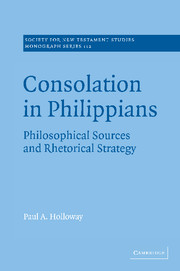Book contents
- Frontmatter
- Contents
- Acknowledgments
- Abbreviations
- Introduction
- Part I Literary and rhetorical contexts
- Part II Consolation in Philippians
- 4 Paul's consolatory strategy: discerning the things that matter (Phil. 1:3–11)
- 5 Discerning the things that matter in the gospel mission (Phil. 1:12–2:30)
- 6 Discerning the one thing that matters in the Christian life (Phil. 3:1–4:1)
- 7 Concluding parenesis, consolation, and thank-you note (Phil. 4:2–23)
- Conclusion: an analysis of Philippians
- Bibliography
- Index of modern authors
- Index of passages cited
5 - Discerning the things that matter in the gospel mission (Phil. 1:12–2:30)
Published online by Cambridge University Press: 06 October 2009
- Frontmatter
- Contents
- Acknowledgments
- Abbreviations
- Introduction
- Part I Literary and rhetorical contexts
- Part II Consolation in Philippians
- 4 Paul's consolatory strategy: discerning the things that matter (Phil. 1:3–11)
- 5 Discerning the things that matter in the gospel mission (Phil. 1:12–2:30)
- 6 Discerning the one thing that matters in the Christian life (Phil. 3:1–4:1)
- 7 Concluding parenesis, consolation, and thank-you note (Phil. 4:2–23)
- Conclusion: an analysis of Philippians
- Bibliography
- Index of modern authors
- Index of passages cited
Summary
In the beginning of his letter Paul offers the Philippians much consolation regarding his imprisonment, showing not only that they should not be troubled, but that they should rejoice.
John Chrysostom, In Epist. ad Phil., praef.We come now to the first heading of the letter (1:12–2:30), which falls naturally into two parts: consolation (1:12–30) and exhortation (2:1–30). We are concerned primarily with the first (consolatory) part, which may be further divided into four smaller sections: 1:12–18a; 1:18b–21; 1:22–6; and 1:27–30. Here Paul applies his thesis that the Philippians must learn to discern “the things that matter” (1:10a) to the problem of his imprisonment. He invites the Philippians, “who have heard that he is in prison and are distressed,” to rejoice with him in the progress (πρoκoπή) of the gospel (1:12–18a) and his own anticipated salvation (σωτρíα; 1:18b–21). These are the things that matter, and they have been furthered by his imprisonment. Again, our exegesis of this material will be selective, focusing on the various consolatory aspects of Paul's argument.
Consolation: rejoicing in the progress of the gospel (Phil. 1:12–30)
Paul introduces the consolation that begins in 1:12 with a common epistolary “disclosure formula”: γινώσκειν δὲ ὑμãς βούλομαι. Similar formulas occur elsewhere in Paul, but none with the infinitive γινώσκειν. Paul's choice of γιννσκειν here recalls the ἐπíγἐωσις of 1:9. The implication is that he will now impart the “knowledge and perception” that, on his view, the Philippians need in order to distinguish the things that matter from the things that do not.
- Type
- Chapter
- Information
- Consolation in PhilippiansPhilosophical Sources and Rhetorical Strategy, pp. 101 - 129Publisher: Cambridge University PressPrint publication year: 2001



